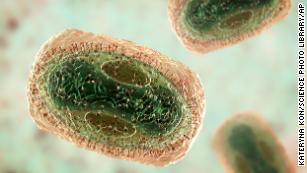Frustration builds in LGBTQ community over government response to monkeypox

When Samuel Garrett-Pate went to get a monkeypox vaccine a couple of weeks ago, it took hours in line, filling out paperwork, running home to get more paperwork and standing in line again at the Los Angeles County Public Health Department. In total, he says, it took him five hours to get a shot.
And Garrett-Pate is one of the lucky ones. His partner works an hourly job, so when his doctor recommended that he get the vaccine, he had to go on his lunch hour. After two hours in line, he gave up and went back to work. He had to start the process over again another day in order to get vaccinated.
It's a scene playing out in public health departments and clinics across the country as the monkeypox outbreak spreads. "State and local public health agencies are doing their best with the resources they have, but the federal government has not done enough and are often not acting fast enough to protect the LGBTQ community," Garrett-Pate said.
"There has not been an aggressive response from the federal government and, unfortunately, even from the White House, a White House that should be leading right now," he said. "This is not about pointing fingers. But at the end of the day, the buck stops somewhere. And we don't have the resources that we need to protect the community."
Garrett-Pate is the managing director of external affairs for Equality California, an LGBTQ+ civil rights group. It and three other organizations sent a letter last week to Dr. Rochelle Walensky, director of the US Centers for Disease Control and Prevention, to demand better vaccine access, testing, treatment and, in general, better plans to mitigate the disproportionate impact that the monkeypox outbreak has had on the LGBTQ community.
Vaccines are free when people can find them, testing costs can add up, and treatments are still difficult to access. Access has been a struggle since the monkeypox outbreak reached the US two months ago. The CDC estimates that about 1.5 million people are eligible for the two-dose vaccine, but as of Thursday, the US Department of Health and Human Services said that 338,000 doses have been delivered.
The San Francisco Department of Public Health told CNN that it requested 35,000 doses of the Jynneos monkeypox vaccine to meet the needs of the community. As of Thursday, it has received only about 12,000 doses -- less than half of what it requested from the federal government.
One of the major public clinics offering the vaccine there had to shut down Tuesday when it ran out after vaccinating 600 people. Georgia's Department of Public Health said it has given out all 13,876 of the vaccines it received so far. Its next allocation of 34,120 will be available over the next four to six weeks. There is more demand than vaccines.
"As soon as we open up appointment slots, they are taken up within a very short mount of time -- minutes," the department's director of communications, Nancy Nydam, said in an email.
As of Friday, New York City's public health department website says all available appointments for vaccines have been filled at this time.
The federal government says it is working to get more vaccines distributed. HHS announced that ordering could begin this week on 786,000 additional monkeypox vaccines. The agency anticipates making about 1.9 million doses available in 2022, with an additional 2.2 million doses available in the first half of 2023.
